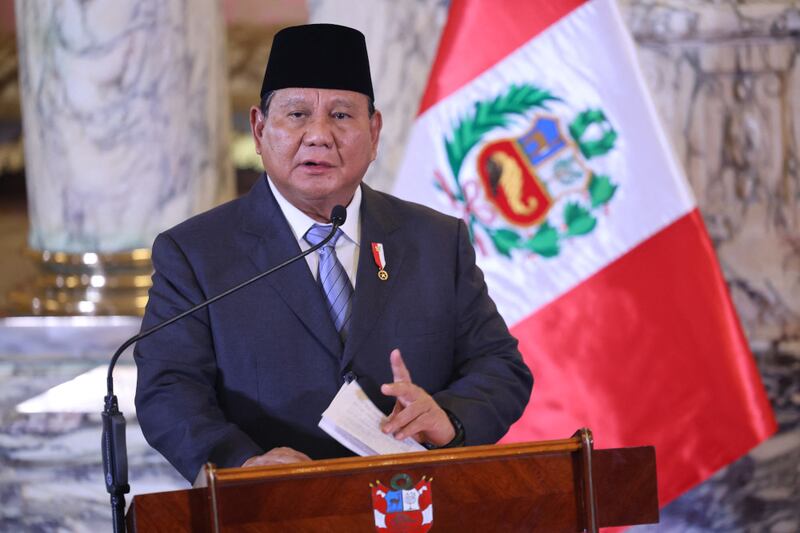Indonesian President Prabowo Subianto is betting big on downstream industries to fuel his country’s economic future.
Prabowo, who took office a month ago, has announced a bold target: $600 billion in investment to transform the country’s natural resources into high-value products. He calls it a cornerstone of his vision for “Golden Indonesia 2045,” marking the country’s centennial.
“We invite foreign investors to come and participate,” Prabowo said during a speech at the Asia-Pacific Economic Cooperation (APEC) CEO summit in Lima, Peru, on Nov. 14.
He outlined plans to develop 26 key commodities, spanning renewable energy, fisheries and mining, as part of Indonesia’s downstream industrialization strategy, known locally as hilirisasi.
But as Prabowo courts international backers, analysts have raised concerns about the potential environmental and social impacts, regulatory consistency and challenges in sustaining local benefits.
For Indonesia, downstreaminghas become a buzzword for economic transformation in Southeast Asia's largest country. By processing raw materials domestically – whether it's refining nickel into ferronickel (an alloy of iron and nickel used to make stainless steel), or producing cosmetics using palm oil – the government hopes to reduce its reliance on commodity exports and strengthen its industrial base.
RELATED STORIES
[ Report: Widespread corruption plagues Indonesia’s booming nickel industryOpens in new window ]
[ China doubles investment in Indonesia during first half of 2022Opens in new window ]
[ In Southeast Asia, protecting the environment is its own hazardOpens in new window ]
The concept isn’t new.
Under former President Joko "Jokowi" Widodo, Indonesia banned raw nickel exports in favor of smelting and refining, a move that increased revenues from U.S. $800 million in 2015 to over $4 billion by mid-2023, according to government data.
Prabowo’s administration aims to replicate this success across other sectors.
“This level of investment is reasonable over five years,” Wijayanto Samirin, an economist at Paramadina University in Jakarta, told BenarNews, referring to Prabowo’s target.
Still, Wijayanto urged the Prabowo administration to avoid repeating the missteps of its predecessor, which he said had resorted to “excessive tax incentives.”
“To make downstreaming work, several aspects must be improved to ensure that it not only adds economic value, but also upholds environmental, social and governance principles,” Wijayanto said.
He identified key areas for reform, including labor and environmental regulations, infrastructure and institutional frameworks.
“The habit of giving away too many tax breaks needs to stop,” Wijayanto said. “We must ensure that the government receives a fair share of revenue from foreign and domestic investors.”

Prabowo’s proposal comes with promises to improve Indonesia’s business climate, including legal reforms, favorable tax incentives and economic stability.
"I think private business wants a certainty of the legal system, private business wants a favorable economic climate, political climate, stability, security, and good conditions, favorable incentives, and these we are addressing," Prabowo said at the APEC summit.
“We have liberalized our laws, we open the health sector for foreign health companies, we are opening our education sector, we invite foreign universities to open campuses, we are inviting foreign hospitals to open their branches in Indonesia.
Indonesia, he declared, was “open for more business.”
"I'm determined to protect all investments, to give favorable economic conditions, and to be involved in the major economic organizations of the world, and to work together with all of you to create mutual prosperity," Prabowo said.
Criticism
But his perceived reliance on foreign capital has drawn criticism.
“Foreign investors often stop at producing intermediate goods,” said Tauhid Ahmad, an economist at the Institute for Development of Economics and Finance (INDEF). “To go further – toward finished products – we need stronger participation from local investors.”
One example of this tension lies in Indonesia’s nickel industry. While the push for downstreaming has boosted exports, the focus remains on semi-finished products including ferronickel, which limit broader economic benefits.
Tauhid argued that sectors such as agriculture and fisheries, with high local potential, should take precedence in future downstream efforts.
Environmental and sustainability challenges
Critics also point to environmental concerns. Despite Indonesia's pledge to embrace renewable energy, much of its industrialization effort continues to rely on coal-fired power plants.
“Downstreaming powered by coal undermines its own goals,” said Nailul Huda, an economist at the Center of Economic and Law Studies (CELIOS). “If implemented with clean energy, downstreaming could boost economic growth by 1.5 times. But under the current model, it exacerbates environmental damage.”
Environmentalists warn that overextraction of natural resources could deplete reserves, turning Indonesia into an importer of raw materials in the future.
“Downstreaming must align with resource sustainability,” said Mahawan Karuniasa, an environmental scientist at the University of Indonesia. “Otherwise, we risk running out of resources while leaving environmental devastation behind.”
Prabowo’s efforts to attract international support have seen some success. During visits to China and the United States after he took office on Oct. 20, Prabowo secured over $10 billion in investment commitments for renewable energy and mining projects.
China, Indonesia’s second-largest foreign investor, has funneled $34.19 billion into the country since 2019, while American companies have expressed interest in geothermal energy and carbon capture technology.
The stakes are high. Prabowo’s vision for Golden Indonesia 2045 aims for 8% annual economic growth, a figure that economists call ambitious.
“Even 5.5% to 6% growth would be commendable if it’s sustainable,” Wijayanto said. “What matters is the quality of growth.”
